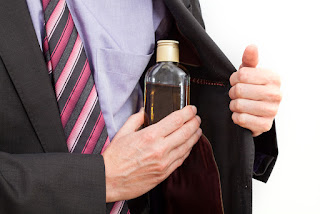 We like to think that alcoholism is obvious; that we would all know if we were living, working, or interacting with someone who was drinking. While addiction may be apparent in certain cases, some alcohol-dependent people manage to hide their compulsion to drink. Over time, addicted individuals become adept at concealing their behavior by lying about their whereabouts, banking creatively to fund their habit, or diluting liquor to conceal how much they have consumed.
We like to think that alcoholism is obvious; that we would all know if we were living, working, or interacting with someone who was drinking. While addiction may be apparent in certain cases, some alcohol-dependent people manage to hide their compulsion to drink. Over time, addicted individuals become adept at concealing their behavior by lying about their whereabouts, banking creatively to fund their habit, or diluting liquor to conceal how much they have consumed.5 Possible Signs of a Hidden Alcohol Addiction
Individuals with alcohol abuse problems hide their drinking for many reasons: to protect their family or marriage, secure their job, safeguard their image, or avoid nagging relatives. Over time, signs of alcoholism may become more apparent as a family member becomes less capable of managing their tangled web of lies and deception.
Common signs of a hidden drinking problem may include:
1. Frequent mention of illness. This complaint may just indicate a hangover, but could also be due to liver damage, a suppressed immune system or the inability to fend off viruses or bacterial infections.
2. Changes in personal appearance or hygiene. A sudden disinterest in showering, oral care, or nutrition could be a symptom of alcohol abuse. Over time, unaddressed neglect of self-care may also lead to gum disease, malnutrition, or gastrointestinal conditions that could complicate a substance abuser’s health.
3. Defensiveness. Men and women struggling with an alcohol addiction can become agitated and defensive when confronted—especially when they are unprepared to admit the problem. Do not let this deter you; seek professional help if necessary. Our addiction counselors can assist you with scheduling a life-saving intervention.
4. Hiding places. Finding a bottle of liquor tucked away in the linen closet or behind tools in the garage is a red flag that your loved one is hiding evidence of their substance abuse problem.
5. Mint & gum use. If your spouse, child, or parent is never without gum or mints—even for short periods of time—they could be disguising the alcohol on their breath.
Help for Hidden Addictions
If you believe that someone you love is hiding a life-threatening alcohol compulsion or substance abuse disorder, call a recovery specialist at 866.930.4673 to schedule an intervention or inquire about comfortable detox programs for alcohol, street drugs, or prescription medications. Our team is available 24/7 and can also be reached using our confidential online form.











